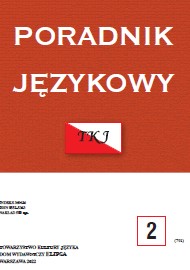NEOLOGIZMY SŁOWOTWÓRCZE O PODSTAWIE ZDEZINTEGROWANEJ KATOWE WSPÓŁCZESNEJ POLSZCZYŹNIE
FORMATIVE NEOLOGISMS WITH THE DECOMPOSED ROOT KATOIN THE CONTEMPORARY POLISH LANGUAGE
Author(s): Krzysztof AndrulonisContributor(s): Monika Czarnecka (Translator)
Subject(s): Lexis, Pragmatics, Western Slavic Languages, Philosophy of Language
Published by: Dom Wydawniczy ELIPSA
Keywords: decomposed root kato; language pragmatics; language and philosophy; Tischner;
Summary/Abstract: The aim of this paper is to describe the functioning of neologisms based on the decomposed root kato-, which takes its origins from the word katolicyzm (Catholicism), katolik (a Catholic) or katolicki (Catholic), in the contemporary Polish language. For this purpose, the author presents his classification and includes the findings of earlier scholars in this field. Subsequently, the collected vocabulary is described from the perspective of language pragmatics in order to, for instance, present the influence of social events and Internet users’ activity on creating new lexis. The conducted analysis demonstrates, among others, a considerable number of terms marked pejoratively, ideologically, and politically. That fact is interpreted from the philosophical point of view proposed in essays written by Józef Tischner. The paper also outlines the possibility to look at the collected lexical resource from the angle of the notion of linguistic worldview. Moreover, it points to a convergence between the results of the conducted analysis and general findings about the development tendencies of the contemporary Polish language.
Journal: Poradnik Językowy
- Issue Year: 2022
- Issue No: 02
- Page Range: 46-63
- Page Count: 18
- Language: Polish
- Content File-PDF

